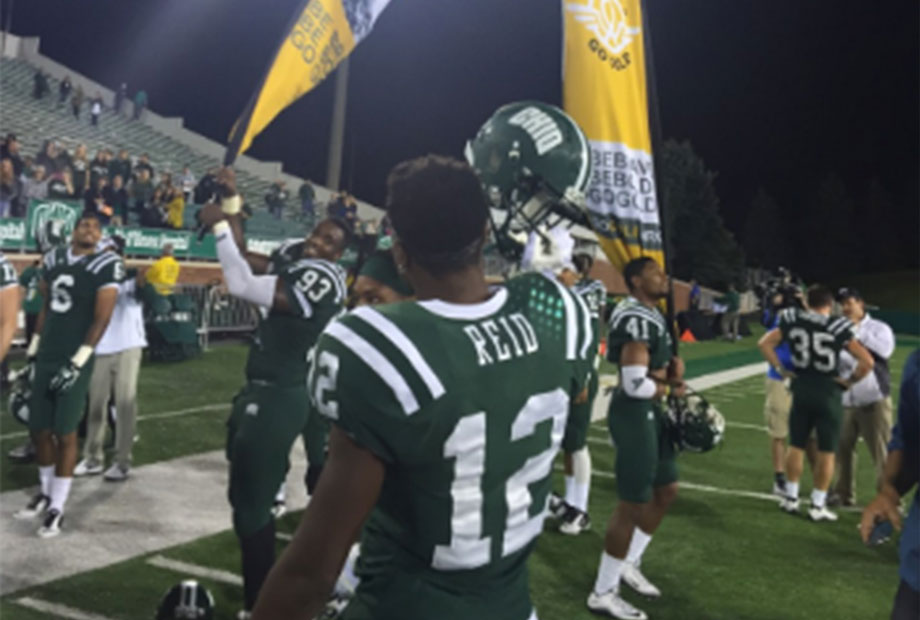
With September being Pediatric Cancer Awareness Month, it bears noting that just four percent of the National Cancer Institute’s goes towards pediatric cancer.
That jarring statistic is what makes a foundation like Turn It Gold so important, is that it’s making sure that the children who face this terrifying disease have support and don’t have to do it alone.
Ohio Athletics is partnering up with Turn It Gold for the Turn It Gold Game, in order to help raise money and awareness in the fight to help the youngest among us through the toughest of battles.
 Turn It Gold found its start after four-year old Charlie Dina was complaining of a stomach ache. After a trip to Texas Children’s Hospital, Mike and Angela Dina received the news that no parent wants to hear: their son had cancer.
Turn It Gold found its start after four-year old Charlie Dina was complaining of a stomach ache. After a trip to Texas Children’s Hospital, Mike and Angela Dina received the news that no parent wants to hear: their son had cancer.
Young Charlie was diagnosed with neuroblastoma, which is a form of pediatric cancer that starts in the adrenal gland and quickly spreads to the bones and bone marrow.
Before he won the Heisman trophy, Charlie’s favorite player, Texas A&M quarterback Johnny Manziel wore a yellow wristband made by the Dina family to help raise money for Charlie’s fight.
Manziel was moved by the young boy’s fight and resolve and even mentioned Charlie on stage as he took accepted college football’s most prestigious award.
When the Manziel family told the Dina’s they were setting up a golf outing to raise money for Charlie’s treatment, they didn’t even have one set up as they were just consumed by “saving the life of our son and focusing on keeping our family and lives afloat,” Angela told Absolutely Memorial Magazine.
They felt it was their calling to start the foundation and help put pediatric cancer on the national spotlight and help increase the funding for those kids who don’t necessarily have that voice as their son Charlie has been in remission for two years.
The story comes close to home for the Ohio football team as one of its own had to wage a battle with pediatric cancer.
Dan Maloney, an undergraduate student defensive assistant from Pittsburgh, before his senior year of high school when he felt it was time to talk to a doctor.
He had been suffering from extreme fatigue and was sleeping at least 10 hours a day. At first he figured he had come down with mononucleosis, but when he took the trip to the Children’s Hospital of Pittsburgh, he was diagnosed with acute myelogenous leukemia.
“I went to the doctor to get checked out for (mononucleosis) a week after the school year had ended and they called me that night and said, `You need to go to the children’s hospital right away. You’re very sick.’ So I went there and I was pretty surprised. I guess I wasn’t too shocked,” Maloney said. “I mean, you’re never going to expect anything like that. But the way I was feeling, it made sense.”
The diagnosis came in June of 2011 and his first bone marrow transplant, occurred on September 29 of that year, but had failed.
He received a second, successful transplant on November 22 from a 20-year old female student at Texas A&M. It was the transplant that saved his life.
“After the first one, we weren’t sure if I would be able to get a second one because the chemo and radiation they use takes a real big toll on the organs,” Maloney said. “I would’ve died if I hadn’t gotten the second one. My body would’ve been too weak and I would’ve had no immune system and I would’ve gotten an infection.”
Maloney had the chance to meet the woman who helped saved his life two years ago at an event thrown by Be The Match, which is the bone marrow registry that connected the two.
“I was a lot more nervous going into than when I was there,” Maloney explained. “You think about what do you say and really there’s nothing to say. I just thanked her and gave her a big hug because I’ve thought about it and you just don’t know how to approach something like that and she was really, really cool.”
To get where he was Maloney had a support system, which he said is invaluable when you’re still a kid going through such a difficult battle. It’s why he feels a cause like Turn It Gold is so important.
“My whole family was there for me. It’s definitely more of a team thing because that’s just something you can’t do by yourself when you’re that young,” he said. “When I was in the hospital, I think some of the best results came for people who had a lot of support. I couldn’t have done it myself.”
#BleedGreen
More Info




